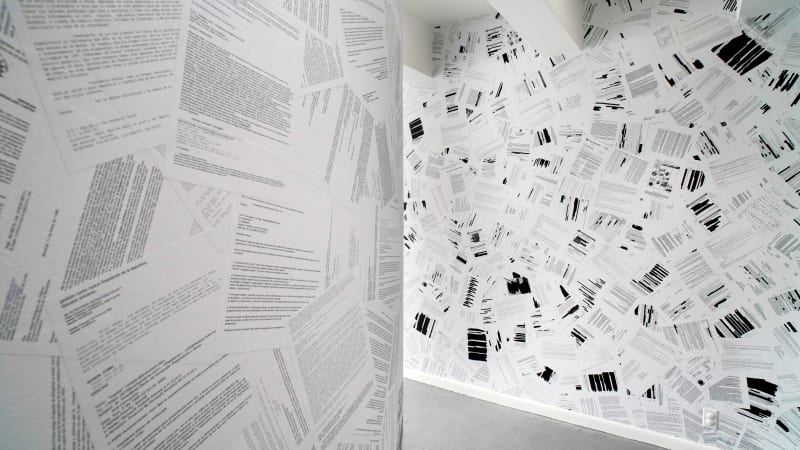The Venezuela-born artist's pioneering work exploring information systems is on view in two shows in Miami
After seeing Yucef Merhi's work, you will never look at an Atari the same way again. The Venezuela-born artist has been using the video game system to create poetic, socially engaged works since he was seven years old. "I was truly passionate about the Atari. It had a quite strange and unique effect on my ability to relate to machines, and technology," says Merhi, who has a solo show opening at Miami's The Bonnier Gallery (2 September-20 November), and is part of the group show Where there is power at Oolite Arts in Miami Beach (until 19 September). "What I truly wanted was to humanise this machine, so I could connect, and create friends, and have some sort of interaction. Each game was an experience-it's a new world-where you have choices, for connecting with something that brings you joy, or some sort of emotion."
The platform perhaps best known for the ground-breaking game Pong has since helped shaped Merhi's view of technology and people's relationship with it. "I learnt about the importance of Atari, which provided us a new world for experiencing computer-related technology, because they pioneered the personal computer business," Merhi says. "People like [Apple co-founders] Steve Jobs and Steve Wozniak, were programming and doing engineering for Atari. They even, asked Nolan Bushnell, the founder of Atari, if he wanted to buy 50% of the shares [for Apple]. And virtual reality was made at Atari Labs, by Jaron Lanier." Merhi still uses Atari machines in new works, such as Compassion (2020), on view at The Bonnier Gallery. In this installation, the video game consoles are hooked up to clear-cased televisions specifically manufactured for use in prisons, and programmed to display the phrase "Compassion is the Divine Compass" while the sound of a Tibetan bell rings out.
But while these systems were cutting edge when Merhi started working with them, they were quickly replaced by newer technology. This led the artist to develop the concept of Retrocycling, which he will be exploring at MIT this fall, as part of a fellowship with its Open Documentary Lab. "It's about acknowledging the existence of these obsolete technologies that guided social and cultural transformation," Merhi says. "I'm finding new applications, and innovative forms of interaction for them."
The project highlights the long-ranging influence of early personal computers and systems, "as well as the historical and the emotional value, the aesthetic qualities and the technical versatility these machines can have," he says. Merhi also believes that such "historic technologies" could "spark the curiosity of young generations" who were born into the digital age, "so they can find new uses for old hardware." And framing such tech as potential artistic materials, Merhi hopes to "extend their lifespan-and by doing that, we also increase their desirability."
Retrocycling is more of a personal philosophy than an artistic concept for Merhi, who still has the circuit boards of the very first computers he owned, as well as Zip drives and boxes filled with floppy disks. "It's like people that carry their albums because they tell stories. Well I can tell you the story about each piece of software that I've got. I have those memories, and they are quite valuable," Merhi says. "Because the past carries energy, as well. We have this idea, that we live in a linear universe, but there are multiple dimensions colliding and creating the reality that we experience. The ancient Greeks saw time as a spiral, so it goes through the same points, but it's in a different location, in a different space. It gets wider and wider."
The repetitive nature of time can also be seen in Merhi's data-based installations, in which he "intercepts" information from official-and often secret-networks. "I see these works as ways for revealing, unveiling, deciphering, decoding that aspect of our culture, that has been hiding," Merhi says. His first such project delved into the files of the largest telecommunication company in Venezuela, while another displayed the personal emails of the country's late president Hugo Chávez. "That piece not only made publicly available the emails of this historical figure. It showed why he got there," Merhi says. "So data can be used as a testimony, or as a form of knowledge, to understand sociological changes, or the psychology behind it. How do we relate to power?"
These projects anticipated the document dumps that would be released some ten years later by hacker groups such as WikiLeaks. More recently, Merhi has turned his attention to the US government's "No Fly List", a database created after the 11 September attacks that restricts individuals from travelling on commercial aircraft based on intelligence reports. An installation at Oolite Arts includes documents Merhi has intercepted with testimonies of people who were placed on the list because they had the same name as others who posed a security threat. "You can find comments from people who are 85 years old, or parents that had their children stopped, for no reason," Mehri says. The work also shows that many of the errors in the No Fly List were not corrected until people in positions of power were affected by them.
"I think I've been always seeking the truth," Merhi says of the uniting thread in his work over the years, from his early forays into understanding computer programming, to his untangling of the webs of power. "The truth about myself, and the truth about the world I live in. And in a way, I think art has provided me with the answers."

